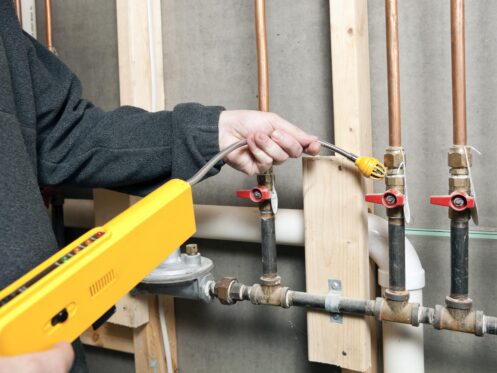If you use natural gas to power your heating system, dryer, or stove, then you know the importance of having a reliable gas line that can safely and efficiently transport the gas to your appliances. it’s important to consider what type of pipe to use when installing or repairing a natural gas line. Here are the most common types of pipes used for natural gas.
Copper Pipe
Copper pipes are the best choice for natural gas lines because of their durability and corrosion-resistant properties. These pipes suit indoor heating systems since they can endure high temperatures. Copper pipes are a practical option with easy installation and low maintenance requirements. Their flexibility allows them to bend around corners, eliminating the need for additional fittings and reducing the risk of system leaks or failures.
However, there are also some cons to consider when using copper pipes. They are more expensive than other materials and may not be suitable for outdoor installations where extreme weather conditions could cause damage over time.
Polyethylene Pipes
Polyethylene pipes (PE) are made of a flexible plastic material and resist corrosion, making them a reliable and long-lasting option. Polyethylene pipes are lightweight, easy to install, and can be used in various applications. They are available in several types, including high-density polyethylene (HDPE) and medium-density polyethylene (MDPE). HDPE pipes are ideal for high-pressure applications and can withstand extreme temperatures, while MDPE pipes are suitable for low-pressure applications and are less expensive.
The main disadvantage of PE pipes is that they are more susceptible to damage from sunlight and UV radiation, which can cause the pipes to deteriorate over time. PE pipes are treated with a special UV-resistant coating to protect against damage from the sun.
Flexible Corrugated Stainless Steel Tubing
Flexible corrugated stainless steel tubing (CSST) is made from thin-walled stainless steel that has been corrugated to increase flexibility and make it easier to install. One of the main advantages of CSST is its versatility. It can be used for outdoor and indoor applications, making it an ideal choice for residential and commercial buildings. Additionally, because it’s flexible, CSST can be easily bent around corners or other obstacles without requiring additional fittings or connectors. CSST also requires fewer fittings. This makes installation faster and easier and can help to reduce the chances of leaks occurring at connection points.
As with any material, there are potential drawbacks when using CSST. For example, some local building codes may require additional bonding when installing this type of tubing due to concerns about lightning strikes and electrical safety.
Black Iron
Black iron is a type of piping traditionally used for natural gas lines. It is made from mild steel and has a protective coating on the outside to prevent rusting. They are known for their resistance to corrosion, strength, and durability. One of the benefits of using black iron pipes for natural gas lines is their ability to handle high-pressure levels. The material can withstand high pressures, making it the best choice for commercial and industrial applications. Black iron pipes are also available in various sizes and lengths, which makes it easy to customize according to specific project requirements. Moreover, they are relative.
However, one downside of using black iron pipes is that they require regular maintenance due to their susceptibility to rusting over time. Regular inspections should be conducted by professionals who can identify any signs of corrosion or damage before it becomes a safety hazard.
PVC Pipes
Polyvinyl chloride (PVC) pipes are lightweight, easy to install, and resistant to corrosion and chemicals. PVC pipes are also cost-effective and widely available, making them popular for residential applications. PVC pipes are prone to cracking and breaking under extreme temperatures and can release toxic fumes when burned.
When it comes to installing or repairing a natural gas line, choosing the right type of pipe is vital for the safety and efficiency of your system. At TYCO Plumbing, we offer professional installation and repair services for natural gas lines in Brighton, CO, and the surrounding areas. Our experienced technicians are committed to providing reliable and safe gas line solutions for our residential and commercial. We also offer other HVAC services such as remodeling, water heater repair, kitchen plumbing, garbage disposal, and sump pump. If you need assistance with any of these services, contact us.



